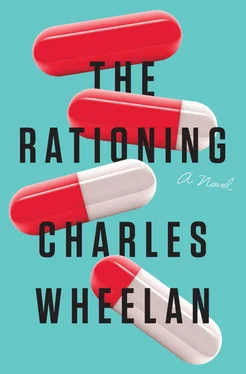“No one knows what virulent means.”
“Fine, say ‘dangerous.’”
She offered her phone to me. “Take this,” she said. “We’ll use my number as the contact number on the updated release.” Just as she handed me her phone, my secure phone beeped with a text from the Chief of Staff: Get to the CNN studio. The Communications Assistant read the text at the same time I did. As I stood there paralyzed, she grabbed her phone back from me. “I’ll get you a car,” she said.
ON BOARD AIR FORCE ONE, THE PRESIDENT AND SENIOR staff monitored the news after the release of the White House statement. News directors all over the world had been waiting for any information from the White House, so they rushed out the first thing to come over the wire. The revised statement, issued after my exchange with the Communications Assistant, was ignored. Almost no one noticed the absence of the word “spread” in the second release, and once we had mentioned the dust mite, there was no way of unringing that bell. Sure enough, CNN broadcast a huge graphic of the North American dust mite, just like the one Tie Guy had been so enamored of days earlier. Prime-time anchor Linda Schuham was alone on camera, presumably having been roused from bed and rushed through makeup. (When I appeared on camera forty-five minutes later, I would not look so put-together.) The electronic banner below the anchor desk read, “Bioterror Attack?”
“At least now we have a question mark,” the Strategist commented sardonically. The Communications Director was calling news outlets, one after another, demanding that they remove any reference to terrorism. His smashed phone—which had been cleaned up, but for the occasional piece that turned up on the carpeted floor—was turning out to be a huge problem. That phone had all his contact numbers; worse, it was the number recognized by the people who needed to be answering his calls. Now he was fighting his way through layers of gatekeepers with each call, screaming things like, “I’m standing next to the President, you fucking peon! Put me on with your producer now or you will never work in the news business again!” [9] Sam Williams Wainwright , In Service to My Nation (New York: W. W. Norton, 2031).
Fox was now running a banner at the bottom of the screen: “White House denies terror attack.” In focusing on the terror angle, however, we had made no progress in disabusing the nation of the belief that Capellaviridae was spreading. By six a.m. on the East Coast, over two thousand school districts had canceled classes. Universities were telling students to stay in their dorm rooms and avoid common areas—even as students rushed to common areas to watch the news warning them to stay out of common areas. [10] Sociologists would later note a sharp reversal in a decades-long trend: Americans were more likely to gather news related to the Outbreak in those early days on television rather than from the Internet. They speculated that the nature of the crisis was such that humans felt an unconscious need to share the news with other people as the situation unfolded.
Americans in the Midwest woke up to reports that most schools and workplaces in the East were closed, further embedding the notion that some kind of plague was sweeping across the nation. Fox News cut to a “Contagious Disease Expert” via satellite, a well-coiffed woman sitting at a desk in an academic office. She explained to viewers, “The dust mite bites an infected person and then bites someone else, thereby passing along the deadly virus.” The Strategist, holding the remote control, was shaking his head no as he listened.
“What advice would you offer?” the anchor asked earnestly.
“Obviously you stay away from other people, since we don’t know who is already infected.”
“And what about the dust mites?”
“Vacuum anyplace they might be found. Wash all sheets and towels in hot water and bleach.”
“Would it be better to burn them?” the anchor asked.
“That’s a good option, if you can do it safely,” the expert advised.
The President roared, [11] The President himself described “roaring” at aides throughout the Outbreak: Robert Evan Steans, Leadership in a Time of Crisis (New York: Crown, 2034).
“Where’s our guy? Why are we not on-screen?”
The Communications Director looked at his watch and answered, “He’ll be up on CNN in about four minutes.”
The Chief of Staff said, “Mr. President, we are going to be in Hawaii in an hour. We have broadcast facilities set up at the air base. We need to start drafting your remarks.”
“I want to see this,” the President said, looking at the television.
The Strategist changed the channel to CNN, where the anchor was talking to a terrorism expert, and then changed it again, this time to MSNBC, which was showing aerial footage of a massive backup on the George Washington Bridge as drivers rushed to leave New York City. “Where do they think they’re going?” the Strategist asked no one in particular. Of course, we now know the answer. Many of these drivers would show up at campgrounds in Vermont and Maine—not willing to risk a motel—where they set up tents or slept in their cars, often completely unprepared for the cold. A young couple from New Jersey wandered into the woods north of Bangor, where there was still snow on the ground, and died of exposure hours later. Hikers found their bodies in June. This urge to drive somewhere was one of the stranger aspects of the Outbreak. An urge to move. To do something . And then there were the gun deaths. A high proportion of Americans believed that repelling Capellaviridae was somehow like fighting zombies. More than three hundred people died from gun accidents in the three days after the Capellaviridae news broke. How exactly was one supposed to fight a lurking virus with a shotgun? People tried, apparently. There were also tragic homicides as paranoid individuals shot neighbors who had come to check in or offer help. Another fifty or so people died in house fires after they tried to burn “contaminated” sheets and towels indoors, sometimes in the bathtub.
Last year Princeton University convened an interdisciplinary conference on the Outbreak: public health officials, virologists, national security experts, and so on. I spoke on some panels, but I also sat in on sessions with scholars who had examined the crisis through a different lens. A psychology professor from the University of Illinois [12] Simran Shankardass, “Don’t Just Do Something, Stand There: The Emotional Need for Volition During the Outbreak, Journal of Social Psychology 169, 1 (2033): 123–146.
spoke about the unique nature of the Outbreak, namely that all Americans perceived themselves at risk, but none, save our political leaders, were in a position to act . One passage from her paper (which she summarized at the conference) has stuck with me, as it helps to make sense of the country’s utter craziness in those first hours:
On September 11, after all the planes had been grounded, Americans could reasonably (if not always rationally) infer that some places (e.g., Omaha) were at lower risk for future attacks than others (Los Angeles). Even when these assumptions were wrong or irrational, the residents perceived that they were in a position to minimize their own exposure.
Americans were also presented with an array of options to “strike back” at Islamic terrorism. Many of these efforts were fruitless, or even counterproductive. Some promoted intolerance; some were illegal. My focus here is not on whether the responses were appropriate. My point is that that there was an opportunity to act [emphasis added]. From a psychological standpoint, this action provided an enormous relief. The Outbreak, on the other hand, put every single American more or less equally at risk and gave them no course of action with which to channel that anxiety. The result was often psychologically devastating.
Читать дальше












